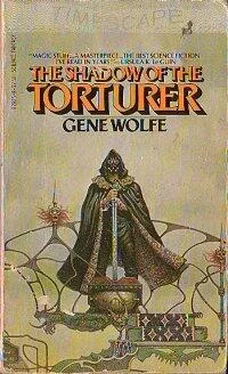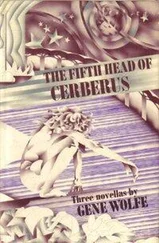In the end I chose one about two cubits high. I had knelt beside it and was reaching toward it when as though a veil had been snatched away I realized that my hand, which I had thought still several spans from the needlelike point of the nearest leaf, was about to be impaled. I drew it back hurriedly; the plant seemed almost out of reach—indeed, I was not certain I could touch its stem even by lying prone. The temptation to use my sword was very great, but I felt it would disgrace me before Agia and Dorcas to do so, and I knew I would have to handle the plant during the combat in any case.
I advanced my hand again, cautiously, this time keeping my forearm in contact with the ground, and discovered that though I had to press my shoulder against the grass as well to prevent my upper arm from being stabbed by the lowest leaves, I could touch the stem quite readily. A point that appeared to be half a cubit from my face trembled with my breath.
It was while I was snapping off the stem—no easy task—that I saw the reason only the short, soft grass flourished beneath the averns. One of the leaves of the plant I was breaking had cut half through a blade of coarse marsh grass, and the entire grass plant, almost an ell across, had begun to wither. Once picked, the plant was an enormous nuisance, as I ought to have anticipated. It would plainly have been impossible to carry it in Hildegrin’s boat as it was without killing one or more of us, so before we reembarked I had to climb the slope and cut a sapling. When the twigs had been lopped, Agia and I bound the avern to one end of its spindly trunk, so that as we made our way through the city later, I appeared to be bearing some grotesque standard. Then Agia explained the use of the plant as a weapon; and I broke a second plant (although she objected, and at even greater risk, I fear, than before, since I was somewhat too confident) and practiced what she had told me. The avern is not, as I had assumed, merely a viper-toothed mace. Its leaves can be detached by twisting them between the thumb and forefinger in such a way that the hand does not contact the edges or the point. The leaf is then in effect a handleless blade, envenomed and razor-sharp, ready to throw. The fighter holds the plant in his left hand by the base of the stem and plucks the lower leaves to throw with his right. Agia cautioned me, however, to keep my own plant out of my opponent’s reach, since as the leaves are removed an area of bare stem appears, and this he might grasp and use to wrest my plant from me. When I flourished the second plant and practiced striking out with it and picking and throwing the leaves, I found that my own avern was likely to be almost as great a danger to me as the Septentrion’s. If I held it near me, there was a grave risk of pricking my arm or chest with the long lower leaves; and the flower with its swirling pattern held my gaze whenever I glanced down to tear off a leaf, and with the dry lust of death sought to draw me to it. All this seemed unpleasant enough; but when I had learned to keep my eyes away from the half-closed blossom, I reflected that my opponent would be exposed to the same dangers.
Throwing the leaves was easier than I had supposed. Their surfaces were glossy, like the leaves of many of the plants I had seen in the Jungle Garden, so that they left the fingers readily, and they were heavy enough to fly far and true. They could be thrown point-foremost like any knife, or made to spin in flight to cut down anything in their path with their deadly edges. I was eager, of course, to question Hildegrin about Vodalus; but no opportunity to do so came until he had rowed us back across the silent lake. Then for a moment Agia became so intent on driving Dorcas away that I was able to draw him to one side and whisper that I, too, was a friend to Vodalus. “You’ve mistaken me, young sieur, for somebody else—do you refer to Vodalus the outlaw?”
“I never forget a voice,” I told him, “or anything else.” And then in my eagerness, I impulsively added what was perhaps the worst thing I could have said: “You tried to brain me with your shovel.” His face became masklike at once, and he stepped back into his boat and rowed out onto the brown water.
When Agia and I left the Botanic Gardens, Dorcas was still with us. Agia was anxious to make her go away, and for a time I permitted her to try. I was moved in part by the fear that with Dorcas near it would be impossible for me to persuade Agia to lie with me; but even more by a vague appreciation of the pain Dorcas would feel, lost and dismayed as she was already, if she should see me die. Only a short time before, I had poured out to Agia all my sorrow at the death of Thecla. Now these new concerns had replaced it, and I found I had poured it out indeed, as a man might spill sour wine on the ground. By the use of the Ianguage of sorrow I had for the time being obliterated my sorrow—so powerful is the charm of words, which for us reduces to manageable entities all the passions that would otherwise madden and destroy us. Whatever my motives may have been, and whatever Agia’s may have been, and whatever Dorcas’s may have been for following us, nothing Agia did succeeded. And in the end, I threatened to strike her if she did not desist, and called to Dorcas, who was then fifty paces or so behind us.
After that we three trudged along in silence, drawing many strange looks. I was soaked to soddenness, and no longer cared whether my mantle covered my fuligin torturer’s cloak. Agia in her torn brocade must have looked nearly as strange as I. Dorcas was still smeared with mud—it dried on her in the warm spring wind that now wrapped the city, caking in her golden hair and leaving smears of powdery brown on her pale skin. Above us the avern brooded like a gonfalon; from it there drifted a myrrhic perfume. The half-closed flower still shone as white as bone, but its leaves looked nearly black in the sunlight.
25. THE INN OF LOST LOVES
It has been my good fortune—or evil fortune, as it may be—that the places with which my life has been largely associated have been, with very few exceptions, of the most permanent character. I might tomorrow, if I wished, return to the Citadel and (I think) to the very cot on which I slept as an apprentice. Gyoll still rolls past my city of Nessus; the Botanic Gardens still glitter in the sun, faceted with those strange enclosures wherein a single mood is preserved for all time. When I think of the ephemera of my life, they are likely to be men and women. But there are a few houses as well, and first among these stands the inn at the margin of the Sanguinary Field. We had walked away the afternoon, down broad avenues and up narrow byways, and always the buildings that hemmed us round were of stone and brick. At last we came to grounds that seemed no grounds at all, for there was no exalted villa at their center. I remember I warned Agia that a storm was brewing—I could feel the closeness of the air, and I saw a line of bitter black along the horizon. She laughed at me. “What you see and what you feel too is nothing more than the City Wall. It’s always like this here. The Wall impedes the movement of the air.”
“That line of dark? It goes halfway to the sky.”
Agia laughed again, but Dorcas pressed herself against me. “I am afraid, Severian.”
Agia heard her. “Of the Wall? It won’t hurt you unless it falls on you, and it has stood through a dozen ages.” I looked questioningly at her, and she added, “At least it looks that old, and it may be older. Who knows?”
“It could wall out the world. Does it stretch completely around the city?”
“By definition. The city is what is enclosed, though there’s open country to the north, so I’ve heard, and leagues and leagues of ruins in the south, where no one lives. But now, look between those poplars. Do you see the inn?” I did not, and said so.
Читать дальше










